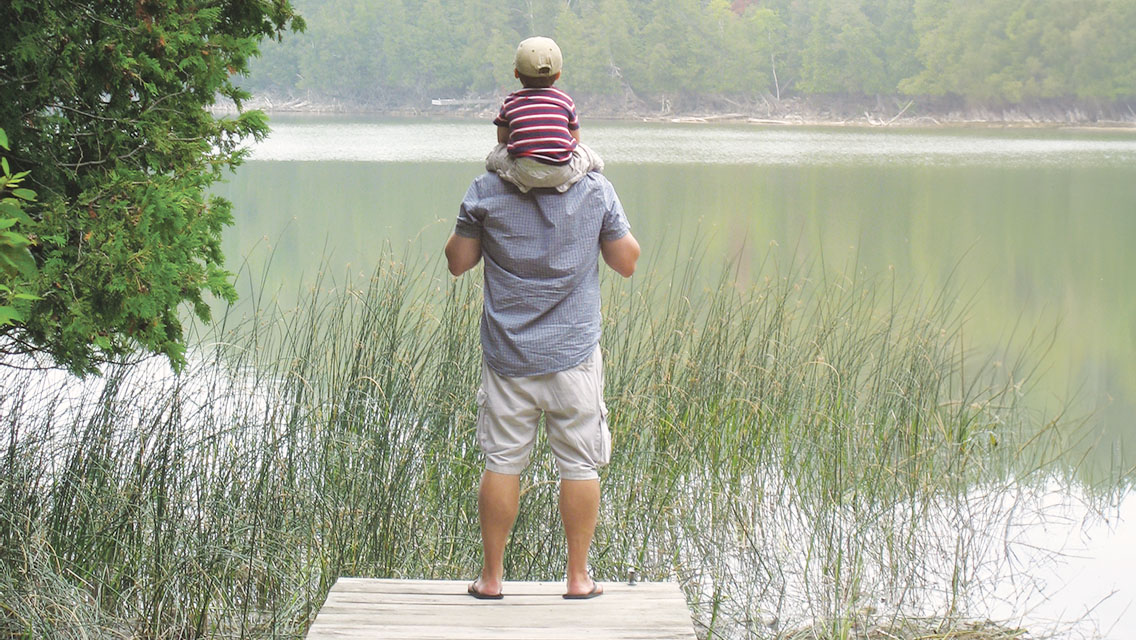As he was growing up in Germany, Bjorn Leonards didn’t exactly see eye to eye with his father. More like nose to nose, as the pair faced off in one argument after another. Today, the 38-year-old furniture maker from Viroqua, Wis., has an open friendship with his pediatrician father. But for most of his life, the two were at odds.
“When I was 12 or so, I wanted to go to church with my parents, but my T-shirt wasn’t tucked in. It was one of the biggest fights we ever had,” remembers Leonards. “Things like appearance were very important to him, but it seemed like he didn’t care who I was on the inside.”
This family cold war turned into a deep freeze after Leonards dropped out of college and declared he wouldn’t attend medical school or take on his father’s practice. Instead, he rambled around Central America and southern Europe before apprenticing to a furniture maker. At this, his father cut off his financial support and Leonards severed communication, eventually going so far as to move to the United States, putting an ocean between them.
Leonards’s story may be an extreme case, but its general contours are typical of the sometimes-rocky path traversed by men and their fathers. Psychologists who specialize in the area agree that the father-son relationship is one of the most complex in a man’s life – and that it’s a relationship that can affect all others.
Unmet expectations on both sides can leave fathers withdrawn and sons exasperated. But even when there’s no open warfare, many men long for a deeper friendship with the men who raised them. Building that kind of rapport can be hard work, but the rewards are commensurate with the effort.
Understand the Divide
It may help to understand that many of the forces driving fathers and sons apart are natural life processes. Beginning in their early teens, boys begin to differentiate themselves from their fathers, often by openly rebelling against the home rule.
As painful as it is for both parties, this adolescent mutiny is an important part of a boy’s development, says Lewis Yablonsky, PhD, professor emeritus of sociology at California State University Northridge and author of Fathers and Sons: Life Stages in One of the Most Challenging of All Family Relationships. “The son is building his own identity,” Yablonsky says. “He needs to find his own way in the world.”
In many families, however, this natural stage turns into a lifelong disconnect. Some fathers are surprised and hurt by a son’s overnight transformation from darling child to snarling teen – and they either fight back or simply retreat from the relationship.
Moreover, whether by nature or nurture, fathers are frequently less open than mothers about their feelings and emotions, says Neil Chethik, author of FatherLoss: How Sons of All Ages Come to Terms with the Deaths of Their Dads. “There’s a self-containedness about many men,” Chethik says. “We’re not usually overflowing with all kinds of words and emotions.” This reticence can deepen the divide between fathers and sons.
Other forces conspiring against father-son bonding are cultural. Work, for example, frequently pulls men away from their families. Add divorce or separation, which are so common to modern families, and the cumulative effects of these various factors can leave a lingering distance between fathers and sons that lasts long past adolescence – and can harm a man’s adult relationships and life choices.
“When we’re not reconciled with our fathers, there’s something inside of us that remains restless, and there’s also something that remains kidlike,” Chethik says. “We don’t really grow up until we have come to terms with our fathers. We need our fathers to bless us in a way that brings us into adulthood.”
Find the Love
For many men, the work of reconciliation begins when they have their own children. That’s because becoming a parent is bound to change a man’s view of his own parents, says Chethik. “When we become fathers, we realize that our fathers may have messed up, but we are messing up, too,” he says. “So we begin to think of them as more human.”
Even if you don’t have children of your own, recognizing that your father is just a man is the critical first step in building a better relationship. To a child, parents are giants – invincible and all-knowing. “That’s an image that our fathers can’t live up to,” Chethik explains. “We have to pass the point where our fathers have to be perfect. That’s an internal battle for a son, but it’s a precondition to reaching out.”
Frequently, however, lingering childhood resentments prevent this from happening. A powerful tool in finding freedom from resentment – and in being able to move beyond holding a grudge – is forgiveness. Ron Jenson, coauthor with his son Matt of Fathers and Sons: 10 Life Principles to Make Your Relationship Stronger, recommends that when it comes to residual bitterness about their fathers, men “grieve it and leave it.” He tells his clients to write down the things they’re angry about and then tear up the paper and bury it in the backyard in a spirit of forgiveness. And then to seek forgiveness from their fathers.
“Forgiveness changes us physically and emotionally, dissolving the stagnant weight of resentment and flooding our bodies with fresh new energy,” writes Mary Hayes Grieco, emotional coach and author of The Peaceful Heart: A Practical Guide to Unconditional Love and Forgiveness. Releasing trauma and adopting a spirit of forgiveness, she continues, “mends our tattered personal boundaries, and empowers us to move forward with more hope and creativity.”
“One man in his 50s had been estranged from his father for years. His father had even taken him out of his will,” Jenson remembers. “This guy was bitter and hurt, and it poisoned every relationship he was in. He went through this process, and he told me that asking for his father’s forgiveness was the hardest thing he’d ever done. He feared he would say no. But instead, his dad slapped the table, jumped up and shook his hand. They made it right, and it positively affected every relationship in his life.”
Make Your Own Way
Some men may not feel as comfortable using such a direct approach. They may find that engaging in a different way – even if they don’t officially bury the hatchet – can help heal their strained relationships with their fathers. “Some men may be reluctant to talk about their feelings,” Chethik says, “but they’re generally not reluctant to tell their stories.” Men can use this propensity for storytelling to generate a closer relationship. Telling each other how they met their wives or describing their high school experiences can help fathers and sons open up emotionally.
That’s how it worked for Bjorn Leonards and his father. After his children were born, Leonards reopened communication and finally went back to Germany to help plan a family reunion. His father started telling stories about his childhood – about being evacuated to a boarding home during the war, the asthma that everyone thought would kill him and the seminary where he was sent as a boy of 10 – stories that allowed Leonards to sympathize with his father’s struggles.
Since then, Leonards’s father has come to visit the United States a number of times, most recently to the home that Leonards had remodeled himself. At one point during the visit, he slipped into Leonards’s workshop, turned on the stereo, and started oiling one of the carpentry projects there. Later he explained, “I just wanted to know what it feels like to be Bjorn.”
For most men, earning their fathers’ acceptance has a profound effect on their relationships and their self-image. “There’s something about the words ‘I’m proud of you’ coming from a father that cannot be duplicated and clears away any wreckage in the relationship,” says Chethik.
That certainly has been the case for Leonards. “He was impressed with my work, and that meant a lot to me,” Leonards says. “He took the time to get to know what it’s like for me and to appreciate my work.” And for his part, Leonards has grown not only to forgive his father, but to value him in turn. “There’s a beautiful flow between us now,” he says. “It’s something I never thought could happen.”
Forging Forgiveness
Being able to find forgiveness in their relationships with their fathers is a major step for sons in mending hurt feelings – and in being able to move forward with their lives. Emotional healer and author Mary Hayes Grieco outlines eight steps of forgiveness:
1. Be willing to change: State your will to make a change in attitude. Be ready to devote your energies to finding forgiveness and moving forward in life.
2. Express your feelings: Share the painful emotion of your experience with a compassionate person.
3. Let go of expectations: Release the unfulfilled expectations you are holding onto.
4. Develop good boundaries: Take responsibility for your actions and give your father responsibility for his.
5. Be open to The healing Process: When you let go of your old resentments, be receptive to the fresh energy, the peaceful feelings and the experiences that accompany a new attitude.
6. Find the lost love: Free of your old hurt, you can send unconditional love to your father.
7. See the good: Change your view of your father; see the good in him and find the positive aspects of the situation.
8. Notice the physical change: When you find true forgiveness, you are emotionally and physically transformed. Pay attention to these changes and allow time to integrate them into your life.
Facing the Father Wound
Every boy, in his journey to become a man, takes an arrow in the center of his heart, in the place of his strength. Because the wound is rarely discussed and even more rarely healed, every man carries a wound. And the wound is nearly always given by his father. – John Eldredge, Wild at Heart
The “father wound,” as John Eldredge describes it, is handed down generation to generation, most often as the result of sons not hearing what they needed to hear from their dads. Men learn they are men, suggests Eldredge, by having their fathers (or father surrogates) notice and reflect their sons’ evolving man-ness—competency, mastery, strength, bravery, intelligence and so on—back to them.
Under the best of circumstances, this happens through male bonding and adventure, through affectionate and approving gestures, and through a variety of attendant verbal and nonverbal “you’ve got what it takes,” “nice shot!” and “atta boy!” messages. In this way, fathers bestow a growing sense of adult masculine identity onto their sons.
But when this doesn’t happen, or when a father instead reflects a surfeit of criticism, disdain, disappointment or ambivalence for his son, the son never fully matures. Instead, he lives with a private fear that he is not really an acceptable or worthy man.
Best-selling author and spiritual teacher David Deida writes at length about this “father wound,” and proposes what may seem a radical solution: “Live as if your father were dead.”
In his book, The Way of the Superior Man, Deida notes that “a man must love his father and yet be free of his father’s expectations and criticisms in order to be a free man.” With this in mind, he suggests the following exercise…
- Imagine that your father has died, or remember when he did die, and then ask yourself: How would you have lived differently if you had never tried to please your father? Never tried to show your father that you were worthy? Never felt burdened by your father’s critical eye?
- For the next three days, do at least one activity a day that you have avoided or suppressed because of the influence of your father. In this way, Deida suggests, you can practice being free of expectations and attitudes that originated with your father, and that you may have internalized without even realizing it.–PG
This article has been updated. It originally appeared in the September 2006 issue of Experience Life.




This Post Has 0 Comments